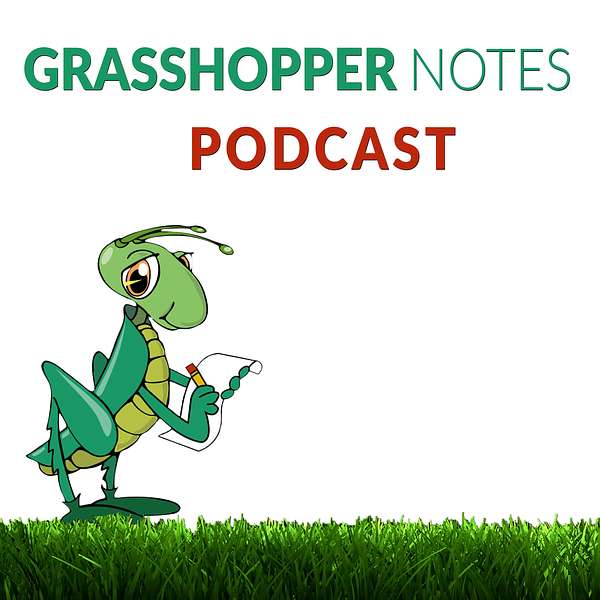
Grasshopper Notes Podcast
The Grasshopper Notes Podcast is hosted by John Morgan the man who has been billed as America’s Best Known Hypnotherapist.
John’s podcasts are a collection of guided meditations and bite-sized, mini podcasts which open you to new ways of thinking, communicating, and responding. You get a finer appreciation of how your mind works and how to use your internal resources to your best advantage.
See a video of John's background at the following link: https://www.youtube.com/watch?v=XbCPd00ok0I
In short, John Morgan is a people helper. Explore this channel and see what he can help you discover.
Grasshopper Notes Podcast
Interesting
Use Left/Right to seek, Home/End to jump to start or end. Hold shift to jump forward or backward.
The use of the word "interesting" has crept into our language more recently. It has varied meaning. Find out in this mini podcast what you're communicating when you use it.
Grasshopper Notes are the writings from America's Best Known Hypnotherapist John Morgan. His podcasts contain his most responded to essays and blog posts from the past two decades.
Find the written versions of these podcasts on John's podcasting site: https://www.buzzsprout.com/1628038
"The Grasshopper" is the part of you that whispers pearls of wisdom that seem to pop into your mind from out of the blue. John's essays and blog posts are his interpretations of these "Nips of Nectar." Others have labeled his writings as timeless wisdom.
Most of the John's writings revolve around self improvement and self help. They address topics like:
• Mindfulness
• Peace of mind
• Creativity
• How to stay in the present moment
• Spirituality
• Behavior improvement
And stories that transform you to a wider sense of awareness that presents more options. And isn't that what we all want, more options?
John uploads these podcasts on a regular basis. So check back often to hear these podcasts heard around the world. Who wants to be the next person to change?
Make sure to order a copy of John's new book: WISDOM OF THE GRASSHOPPER – 21 Days to Creativity. These mini-meditations take you inside where all your creative resources live. And you'll come out not only refreshed but recommitted to creating your future.
It's only $16.95 and available at BLURB.COM at the link below. https://www.blurb.com/b/10239673-wisd...
Also, download John's FREE book INTER RUPTION: The Magic Key To Lasting Change. It's available at John's website https://GrasshopperNotes.com
Interesting
I’m sure you’ve noticed that words have different meanings when they're said in a different tone. That’s one of the reasons that emails, texts, and DMs are not a highly effective form of communication. The written or typed word leaves lots of room for interpretation.
The spoken word is catching up. I’ve noticed the word “interesting” is one of the words that contains many meanings in speech. It’s a catch-all word that people are using with increasing frequency.
For example, if someone asks you if you like something, you can respond with “Oh, that’s quite interesting.” It says nothing but it covers the base and you dodge the question.
Someone posits an idea and you say, “how interesting.” You may think it’s the dumbest thing you've ever heard, but “interesting” let’s you contribute without contributing. It’s sort of like charitable deductions on your taxes. If they ever added up the money people claimed they gave to charity, the houses of worship and organizations listed would never need another dime.
People are using “interesting” to get off the commitment hook. They don’t have to engage when they use it and it keeps them out of confrontational conversations. It’s a great tool when used sparingly.
Even the genuine use of the word “interesting” is incomplete. When we authentically say something is interesting, it’s as though we’re stating a fact. We aren’t. We’re stating an opinion.
I have a recommendation. I suggest that when you state that something is interesting, that you add the words “to me” to the end. This completes the word “interesting” and references it to you.
I don’t think anyone will ever define the word “interesting” because it is one of the most fluffy, elastic words in our language. But referencing it to you keeps it out of the world of asserted facts and into the realm of opinion, where it truly belongs.
Many words can use a “to me” addendum. Here are a few to consider: Boring, ugly, pompous, selfish, funny, sexy. The list is endless.
The telltale clue that you need “to me” is when you’re about to make an assertion about something or someone. “He’s . . .” She’s . . .” “It’s . . .
Opinions asserted as facts, even when they’re baseless, bring up counter "facts" and off to the races you go – "fact-ing" each other.
When you add “to me,” you take ownership of the assessment and don’t imply that everyone has to agree with you.
When you stop stating things as facts and start labeling things as your opinions, there's a lot more wiggle room in the conversation – room for something new to develop, rather than the same old stimulus/reaction that unsupported “facts” bring up.
Question: Don't you find this interesting? It is to me.
All the best,
John
